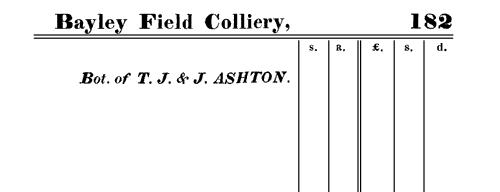
Flowery Field Colliery was connected by a tramway, about ¾-mile long, to the south side of the Newton Wood Private Branch of the Peak Forest Canal where coal from the colliery was loaded into boats. The route of the tramway was to the east of Newton Hall and for part of the way it followed what is now Dukinfield Road. By the time of the Tithe Map of 1847 the tramway appears to be disused and Flowery Field Colliery is not shown. However, the occupiers of much of the land were Henry Lees and Samuel Swire, partners in the Dukinfield Coal Company, owners of Flowery Field Colliery.
Tithe Map: 1847. Courtesy: Cheshire Archives & Local Studies.
Please use the Scrollbar to scroll down the map.
For Dunkirk Coal Company click here » Dunkirk Coal Co
Black Mine Disaster at Flowery Field Colliery
On Friday, 8 April 1842, Flowery Field Colliery was the scene of the Black Mine disaster in which 17 miners were killed.
For the Black Mine Disaster click here » Black Mine
♦ ♦ ♦
Two other collieries near Flowery Field Colliery were:
Bayley Field Colliery
This was situated in the grounds of Bayley Field Mill near the junction of Newton Street and Lodge Street (now Lodge Lane).
The three proprietors were Thomas, James and John Ashton who were cotton manufacturers and merchants trading under the style of Thomas, James and John Ashton at Hyde and Newton. Later this company became known Ashton Brothers & Co.
Coal from this colliery would have been used to fire the boilers of Bayley Field Mill and the adjoining Carr Field Mill, both of which were owned by the Ashton family.
It is understood that the coal seams worked were the Black, Cannel (or Two Foot), Peacock and Stone. By 1842 the shaft was 166-yards deep to the Peacock Mine. Bayley Field Colliery closed in 1888.

Daisy Field Colliery
This colliery was situated to the north east of Hyde Park on the north side of the railway line. The proprietors were William Booth and John Marland trading as Booth & Marland.
In 1873 this partnership was dissolved when William Booth stepped down* and the business was continued by John Marland trading as John Marland & Co. Afterwards he was joined by James Anderton Dewhurst.
In 1876 the partnership of John Marland and James Anderton Dewhurst was dissolved when John Marland stepped down and the business was continued by James Anderton Dewhurst trading as the Daisy Field Colliery Co.
In 1877 this company became bankrupt and probably this is when the colliery closed.